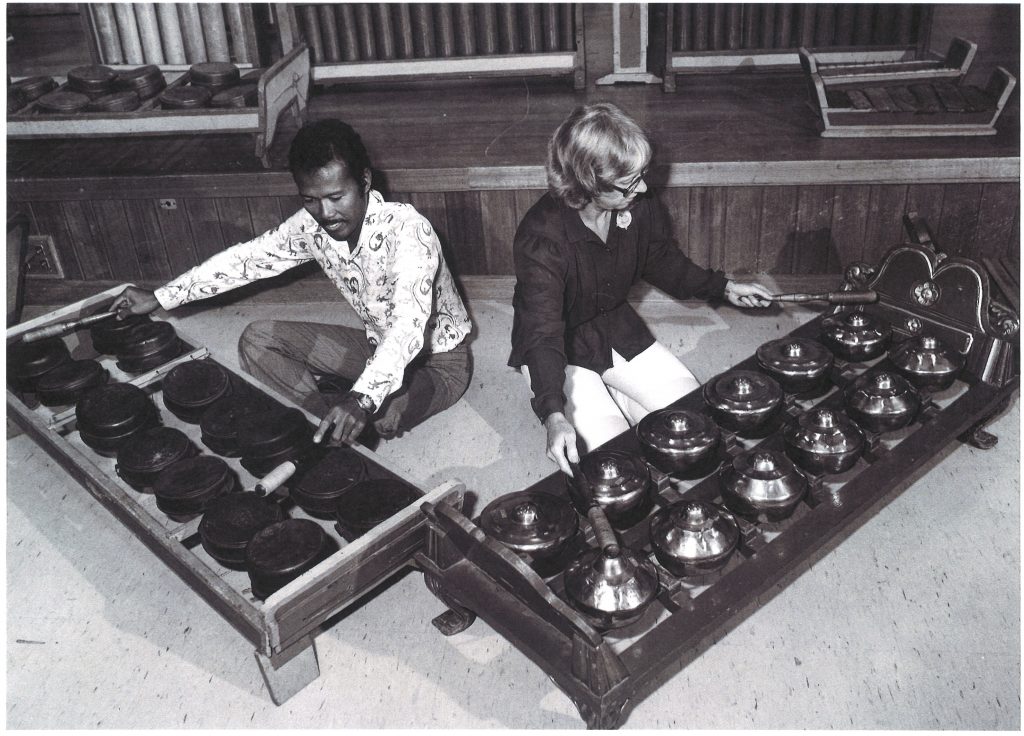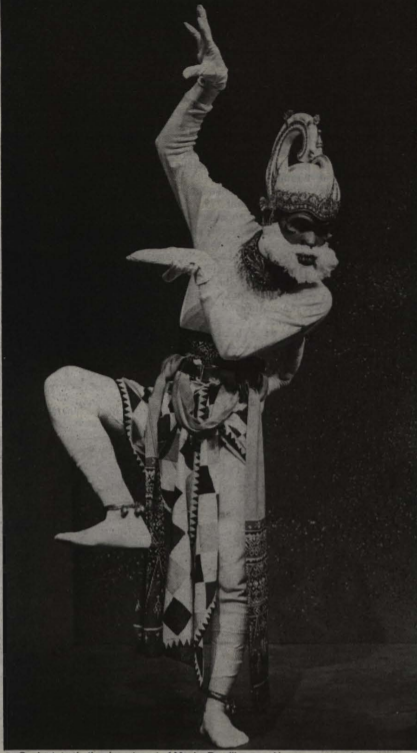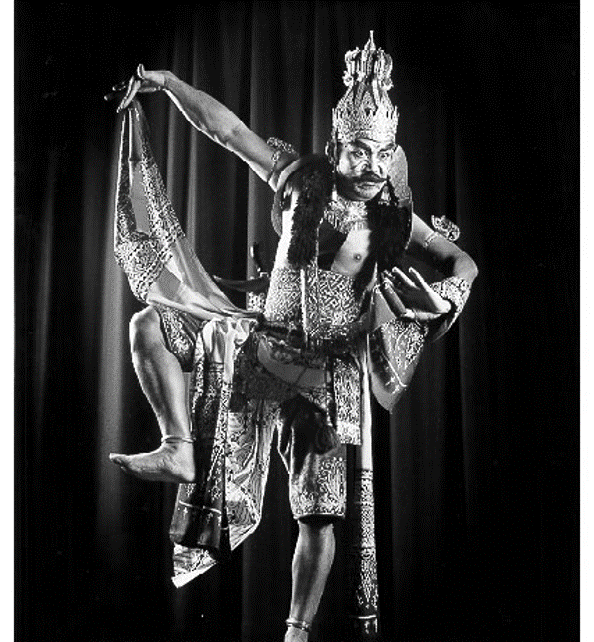
Pak Poedijono died peacefully in a Melbourne hospital at 5.53pm on 30 January 2021. Music and performing-art lovers in Melbourne and other cities in Australia will remember him as a tireless, enthusiastic and highly talented performer and promoter of the Javanese performing arts in Melbourne.
For many years he taught and led Javanese gamelan, dance and wayang performances in the Department of Music at Monash University, and subsequently at the University of Melbourne, and some interstate universities such as Adelaide and Launceston. He was an accomplished wayang kulit puppet theatre master (dhalang) and a fine dancer, singer, and player of all the string, wind and percussion instruments in the Javanese gamelan orchestra.

Born in 1940 into a family of performing artists in Wonogiri, Central Java, his father was a professional dhalang who asked him to sit alongside him and hand him the puppets at some of his performances. Thus he was exposed at an early age to the Javanese theatre and oral literature and learned from childhood the nature of the characters in Javanese versions of the Ramayana and Mahabharata epics portrayed in his wayang and dance performances. He was even allowed to perform a one-hour show based on the Muncul story at age 9, and at age 16 he had the opportunity to lead such a wayang performance himself.
His formal training in gamelan and wayang was undertaken at the Indonesian Arts School (SMKI) in Surakarta where he acquired a Diploma of Performance in wayang and gamelan. After he graduated, Bp Panji, Head of the Indonesian Arts School SMKI in Den Pasar, invited him to teach Javanese gamelan there and he moved to Den Pasar. One day Pak Panji introduced him as a rare all-rounder Javanese performer to an Australian visitor, Margaret Kartomi, who subsequently invited him to take up a teaching position at the Department of Music at Monash University.

Thus it came about that in 1973 he moved to Melbourne to teach gamelan performance, followed later by his wife, Ibu Merthi. At first, he directed public performances on a gamelan slendro that we borrowed from the Indonesian Embassy in Canberra, with transport and other facilities provided via a grant from the Australian government’s Department of Foreign Affairs. In the next two years he directed a different series of repeat performances per annum attended by hundreds of Victorian primary and secondary school students learning Indonesian language, and from the ticket sales we were able to buy Monash’s own complete gamelan slendro-pelog and a set of wayang kulit puppets from Wonogiri through Pak Poedijono. He introduced the use of English in his wayang performances so that his audiences could become engaged in the shows and begin to acquire a deeper understanding of aspects of Javanese culture.
Each year thereafter we wrote a script for a dance drama production based on a different Javanese legend, and Pak Poedijono and Ibu Merthi trained local Javanese dancers such as Cathy Mardisiswoyo, giants such a Basoeki Koesasi, and clowns such as Mohammad Slamet and Hidris Kartomi to act out comic situations as the clowns Petruk, Gareng and Semar speaking a blend of Javanese, Indonesian and English at concert productions in Monash’s Alexander Theatre and Robert Blackwood Hall, accompanied by students and staff on the gamelan. One of his students from those days writes: “I remember him very fondly as a brilliant musician and a wonderful, and exceptionally patient, teacher with a wicked sense of humour.”
Poedijono also starred in these annual performance series at Monash with his wife Ibu Merthi, herself a highly talented and widely respected Balinese dancer, teacher, and concert organiser.
One year they presented a performance of the famous Balinese kecak dance, with Ibu Merthi dancing in the centre of a ring of dancers who performed group vocal and body percussion based on an episode from the Ramayana. Together Poedijono and Merthi formed the Balinese Dance Society and presented many performances of Balinese dances to Melbourne audiences. Their two daughters, Eka and Ade also became fine dancers.
From 1979, Poedijono also made regular visits to Launceston, Tasmania, where he taught and performed gamelan music, dance and puppetry at a variety of communal and educational institutions. He became a great friend of the community and Queen Victoria Museum and Art Gallery (QMAG) of Launceston, instilling a love of Javanese and Balinese performing arts in the region.

In Australia’s special bicentennial year of 1988, Monash Music Department presented a concert program in the Robert Blackwood Hall comprising three intercultural dance drama episodes from the Ramayana – Javanese, South Indian and Thai, with Poedijono directing the Javanese component. The large audience included delegates of the Symposium of the International Musicological Society and the general public.
In subsequent decades Poedijono continued to inspire and teach many grateful students and adult groups and to direct performances at the universities as well as members of the Melbourne Community Gamelan, of which he was the founder. For his sustained dedication to Javanese arts performances he was honoured by the Australian government with an OAM (Officer of the Order of Australia) in 2003 and by the Indonesian government with a prestigious Satya Lencana award in 2007.
Poedijono’s Impact on the Javanese Cultural Scene in Melbourne
Poedijono has left an important cultural legacy in Melbourne. When he first arrived in Melbourne 47 years ago, there was only one gamelan set in Australia: a small Sundanese gamelan acquired by Pak Bernard Ijzerdraat (alias Suryabrata) in the Department of Music, University of Sydney. After Monash’s Department of Music developed the discipline of ethnomusicology from the late 1960s, Poedijono was asked to choose and buy Monash’s own gamelan -the first complete Javanese gamelan in Australia, and Monash’s staff and students began to research various aspects of Indonesian music, bringing back their field recordings for deposit in the Music Archive of Monash University (MAMU). Now there are more than 40 sets of iron and bronze gamelan in Australian schools, universities, and cultural, educational and private groups.
In the 1990s and early 2000s, gamelan and related performances of Asian music became a regular feature at the National Victorian Arts Gallery in Melbourne, where dedicated groups like the Melbourne Community Gamelan, PERMAI, and Mahindra Bali played and accompanied wayang shows and various dances. However, since the late 1990s there has been a gradual decline in Indonesian language teaching in Australian secondary and tertiary institutions, and as a result gamelan and related Indonesian cultural activities were also somewhat reduced. Moreover, Poedijono’s own personal health has limited his activities in recent years.
Poedijono is survived by his wife Ibu Merthi, daughters Eka and Ade, and grandchildren. Vale, and thank you, Pak Poedijono.
